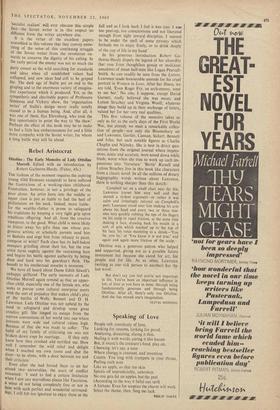Rebel Aristocrat
Ottoline : The Early Memoirs of Lady Ottoline Morrell. Edited with an introduction by Robert Gathorne-Hardy. (Faber, 45s.)
THE fashion of the moment requires the aspiring young (Old Etonians excepted) to have suffered the frustrations of a working-class childhood. Frustration, however, is not a privilege of the Poor alone. An artist born into the middle or upper class is just as liable to feel the heel of philistinism on his neck. Indeed, more liable : for the wealthy .father is prone to safeguard his traditions by peeping a very tight grip upon rebellious offspring. And all, from the creative viewpoint, to the, good. What child is more likely to fritter away his gifts than one whose pro- gressive artistic or scholarly parents send him to Bedales and urge him from infancy to paint, compose or write? Each class has its half-baked manques grizzling about their lot, but the true artist turns eagerly against the restraining foot and begins his battle against authority by biting deep and hard into his guardian's flesh. The benefit to his intellectual muscles is immense.
We have all heard about Dame Edith Sitwell's unhappy girlhood. The early memoirs of Lady Ottoline Morrell again remind us that an upper- class child, especially one of the female sex, who seeks to pursue some cultural enterprise meets with the sort of prejudice that makes child's play of the battles of Wells. Bennett and D. H. Lawrence. Lady Ottoline was not upheld by the need to safeguard and develop some great creative gift. She longed to escape from the narrow conventions of her world into one where interests were wide and cultural values high. Because of that she was made to suffer: 'The habit of my faMily of criticising me was not broken down evsn by marriage. . . If they only knew how they crushed add terrified me. How well I remember the wild relief and delight when I reached my own room and shut the door—to be alone, with a door between me and their criticism.'
Even after she had forced them to let her attend two- universities, the scars of conflict remained: 'I used to feel a certain limitation when I saw any marvellous places like Taormina. a sense of not being completely free or not in tune with such perfect and wonderful surround- ings. I still felt too ignorant to enjoy them to the
full and as I look back I feel it was true. I was too pent-up, too conscientious and not liberated enough from tight inward discipline. 1 seemed to be under the spell of some tyranny which forbade me to enjoy freely, or to drink deeply of the cup of life in my hand'
In his generous introduction Robert Ga- thorne-Hardy dispels the legend of her absurdity that rose from thoughtless gossip or malicious anecdotes of mean half-men like Logan Pearsall- Smith. As can readily be seen from the Letters, Lawrence made honourable amends for his cruel portrait in Women in Love. After her illness, we are told, 'Even Roger Fry, an arch-enemy, went to see her.' No one, I suppose, except David Garnett, really believed she was mean; and Lytton Strachey and Virginia Woolf, whatever image they build up in their exchange of letters, valued her for her very real qualities.
This first volume of the memoirs takes us only as far as the early days of the First World War, but already we meet a remarkable collec- tion of people—not only the Bloomsbury set and Lawrence, Gertler, Cannan, Sickert, Bennett and John, but such notable figures as Charlie Chaplin and Nijinsky. She is best in direct quo- tations from the original journal where impres- sions, acute and accurate, were noted down while fresh; worst when she tries to work up such im- pressions into 'literature.' Bertie' Russell and Lytton Strachey live in this book like characters from a classic novel. In all the millions of dreary hagiographic words written about Lawrence, there is nothing sharper than this sketch:
Campbell sat on a small chair near the fire; Lawrence knows him very well and they started a violent argument—or rather it was calm and irritatingly rational on Campbell's part; Lawrence stood over him shaking his arm above his head and every two or three min- utes very quickly rubbing the tips of his fingers on his scalp in rapid friction, at the same time making a face, drawing back his mouth in a sort of grin which reached up to the top of his face, his voice mounting to a shriek—'You lie, you lie,' or 'You know it is not true,' and again and again more friction of the scalp.
Ottoline was a generous patron who helped and supported, giving not as a possible future investment but because she cared for art, for people and for life. As so often, Lawrence (writing as one sick person to another) has the last word:
But don't say you feel you're not important in life. You've been an important influence in lots of lives as you have in mine; through being fundamentally generous and through being Ottoline. After all, there's only one Ottoline. And she has moved one's imagination.
OLIVIA MANNING


































 Previous page
Previous page